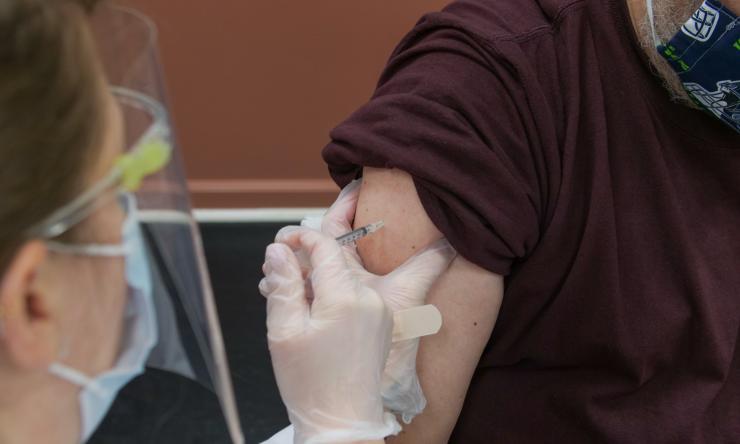Vaccine is best way to manage flu during the pandemic
This school year has seen concerns about the spread of COVID-19, and soon the start of influenza season brings another potential illness that may spread among classmates, teachers and their families outside of school. Fortunately, there are a variety of flu vaccination options that are available to almost everyone, according to an expert at Baylor College of Medicine.
“In the United States, it is recommended that everyone over the age of 6 months be vaccinated against the flu, and there are many vaccines available that will fit your need based on age and other important risk factors,” said Dr. Pedro Piedra, professor of molecular virology and microbiology and of pediatrics at Baylor.
Last year’s flu season was one of the mildest we have ever seen, due to the public health measures such as masking and social distancing implemented during the COVID-19 pandemic. But in many places, these guidelines have been lifted, and flu season could look quite different in 2021 – 2022.
Here are some important things to keep in mind about the flu vaccine, according to Piedra:
All the influenza vaccines (inactivated, recombinant and live attenuated) available in the United States during the 2021-22 flu season are quadrivalent. That means they contain four components to protect against the seasonal influenza viruses: influenza A(H1N1)pdm09, influenza A(H3N2), influenza B (Victoria lineage) and influenza B (Yamagata lineage).
- Children under 9 years of age who have never received the influenza vaccine should get two doses of the vaccine four weeks apart
- Those under 9 years of age who have received only once a single dose of a flu vaccine in the past should get two doses of the vaccine four weeks apart
- Because babies under 6 months of age cannot get the vaccine, it is recommended that everyone in the child’s household be vaccinated to protect the child
Pregnant women should get the inactivated or recombinant vaccine (the flu shot) at any time during pregnancy to protect themselves and their unborn child. Antibodies transferred via the placenta from the vaccinated mother to the newborn infant will provide protection to the infant during the first six months of life. Breastfeeding also will provide a level of protection.
It is recommended that adults over the age of 65 years get a high-dose or adjuvanted flu vaccine.
There also are vaccines that are not derived from eggs for those who have a history of a severe, life-threatening egg allergy.
FluMist (live attenuated virus)
Piedra, who also is with Texas Children’s Hospital, said that the availability of the FluMist will be beneficial for children, who are more likely to be fearful of shots. He also noted that the biggest protection benefit of the FluMist has been demonstrated in children.
The FluMist is approved for those between the ages of 2 and 49 years who are healthy. FluMist is a live attenuated influenza virus vaccine and is not recommended for:
- Children taking aspirin or aspirin-containing medication
- Those who have a history of a severe allergic reaction to the vaccine or any of its components
- Those who have received influenza antiviral medication within 48 hours
- Women who are pregnant
- Those with a significant health condition such as immunodeficiency, moderate to severe asthma, etc.
Those with other medical conditions should discuss with their physician if the live vaccine is recommended for them.
Flu shot (inactivated and recombinant virus)
There also are a number of inactivated flu vaccines available for individuals over the age of 6 months. The recombinant flu vaccine is available for adults 18 years of age and older. The only contraindication for inactivated and recombinant influenza vaccines is a history of a severe allergic reaction to the vaccine or any of its components. Piedra recommends consulting with your child’s pediatrician on which vaccine is best for them.
In addition, anyone with a history of Guillain-Barré syndrome within six weeks of receipt of an influenza vaccine should talk to their doctor.
Take early action
Piedra recommends getting vaccinated against influenza now and not waiting for the outbreak to begin. It takes about two weeks for the vaccine to be fully effective in adults and children who require one vaccine dose. However, for children who require two doses of the vaccine at least four weeks apart, it will take about six weeks to be fully effective.
Adults who are eligible for a COVID-19 booster shot because of age, underlying medical condition, are at increased risk for COVID-19 infection because of the work environment or are getting the COVID-19 vaccine for the first time may consider getting it and the flu vaccine at the same time. The CDC recently updated its guidance to state that COVID-19 vaccines may be administered on the same day as other vaccines. If getting both at the same time, expect to receive one in each arm.
While the vaccine is effective, some may still contract influenza. Piedra recommends discussing the need for an influenza antiviral strategy with your physician so that if there is breakthrough infection, you can get a prescription for antiviral medication quickly. Antiviral therapy is most effective when administered in the first 48 hours of symptom onset.
“The flu season is unpredictable every year, but the best way to protect yourself and your loved ones is to get vaccinated,” Piedra said.










